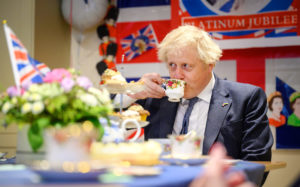Aspiration is a word forgotten by the Conservative Party. It’s certainly not a word that’s forgotten by me. In only one generation, my family went from being born in council housing and needing to muck out the pigs before heading out to school, to providing a comfortable suburban upbringing that paved the way to my own graduate career in financial services. What better example of “pull yourself up by your bootstraps” conservatism could there be than this?
I first joined the party around 2011, 18-years-old and full of belief in the values that I think have delivered so much for my family, and the country at large. The right of individuals to choose how to spend their own money. The power of liberalised markets to deliver improvements in living standards. The importance of our national institutions. Empowering individuals to live their life on their terms. My belief in these values has not changed.
What has changed is the Conservative Party. While its leadership candidates would happily agree with these aspirational principles, to be a young Conservative today feels like being a Judas goat, leading its own generation towards destitution. It’s not just me — my circle of young party members didn’t have a positive word to say when we found out the choice was between the two continuity Johnson cabinet candidates.
I want to light a fire under the arse of the party. I want to grab it by the lapels and shout with the moral fury of a cri de cœur: “You cannot continue like this”. A country must build for its future, not relentlessly indulge its present. To continue as we are, offering crumbs to the young while ceaselessly gifting jam to the Baby Boomer generation, simply because it wins elections in the short term, is not just bad for our party’s electoral prospects in the coming decades. It is fundamentally unpatriotic and unconservative.
Acting against conservative principles has consequences. Thank goodness, the leadership debate has finally noticed Britain’s appalling growth record over the past decade and a half — a period that awkwardly coincides with 12 years of Tory rule. The leadership candidates even openly admitted in the BBC leadership debate that the party’s economic management has failed to make Britain any better off. We are no richer than we were before the financial crisis. The march of economic progress — the increases in real earnings and upgrades in living standards that defined postwar Britain — has stalled.
“We have had a consensus of the Treasury, of economists, with the Financial Times, with other outlets, peddling a particular type of economic policy for 20 years. It hasn’t delivered growth,” said Liz Truss. She’s right. If we don’t change course, we could well see the United Kingdom fall behind the per capita GDP of Poland in little more than a decade. The former Soviet satellite state had to play catch up after it was forced to run an uncompetitive and sclerotic command economy for the best part of five decades. What excuse does Britain — the birthplace of free trade, and of the industrial revolution — have for its lacklustre economic performance?
“What people in Britain desperately need now is change,” Truss added. She is, at least, challenging the orthodoxy that has led us to this juncture. But, like a plague doctor from 1769, while her diagnosis might be right, her cure is the equivalent of stripping at midnight during a full moon and standing in a barrel of eels. I lean heavily to the Right on economics — I should be delighted by Truss’s promises of immediate tax cuts to the tune of £30bn per annum. She’s proposed a reversal of the manifesto-breaching National Insurance hike, cancelling the planned 6p rise in corporation tax, and a two-year suspension of the green levy — a particularly eye-catching and juicy policy with energy bills soaring. Sunak, meanwhile, has pledged to cut the basic rate of income tax to 16% by 2029.
In one sense, less taxation is exactly what I want to see from a Conservative government, not least with my own marginal rate reaching beyond an eye-watering 60%. Cutting taxes is the fillet steak of red meat Thatcherism, is it not? While Truss may be claiming the mantle of Margaret Thatcher as her own with her tax cuts proposals, what the proposals forget is that Thatcher was cautious on tax cuts until the hard work — of eliminating the economy’s structural weaknesses — was done. In fact, taxation as a share of GDP continued rising into the early Thatcher years, only consistently falling after 1985, six years into the Conservative government.
In the Seventies, the structural weaknesses were all-powerful unions obstructing industry reform and undead, state-owned businesses kept going only through public subsidy. Modern Britain has its own equivalent of this economic drag anchor: the cost of housing and its root cause — the utterly dysfunctional planning system.
That planning system is designed not around growth, progress or even necessity. Rather, it is almost exclusively geared towards securing the lifestyle and preferences of those who already own — and who overwhelmingly oppose development. The result is laughably predictable: a severe supply shortage of homes and rocketing prices that far outstrip languid growth in earnings. Astonishingly, property listing website Zoopla found last year that one in five homes “earned” more in a year than the average UK salary. So much for the dignity of work.
We cannot expect anything other than a sclerotic economy if we throttle the supply of workers in our most productive regions through high housing costs. One study found that by restricting access to workers through planning regulation, aggregate economic growth in the United States was a third lower than it could have been between 1964 and 2009. The cost may even be higher for the United Kingdom. Choking off all development is not small-c conservative protection of the “local character” of our neighbourhoods. It is nation-wrecking.
London, host to some of the most productive financial and legal services in the world, is now home to house prices 14 times greater than median incomes. Between the war and 2000, this multiple never rose above six. In Oxford and Cambridge, home to countless high-productivity businesses associated with the crown jewels of British higher education, the multiple exceeds 12. There is a clear economic incentive for young people to steer well clear of the country’s most productive jobs. That means lower growth, lower living standards, higher taxes, and worse public services.
Disclaimer
Some of the posts we share are controversial and we do not necessarily agree with them in the whole extend. Sometimes we agree with the content or part of it but we do not agree with the narration or language. Nevertheless we find them somehow interesting, valuable and/or informative or we share them, because we strongly believe in freedom of speech, free press and journalism. We strongly encourage you to have a critical approach to all the content, do your own research and analysis to build your own opinion.
We would be glad to have your feedback.
Source: UnHerd Read the original article here: https://unherd.com/





